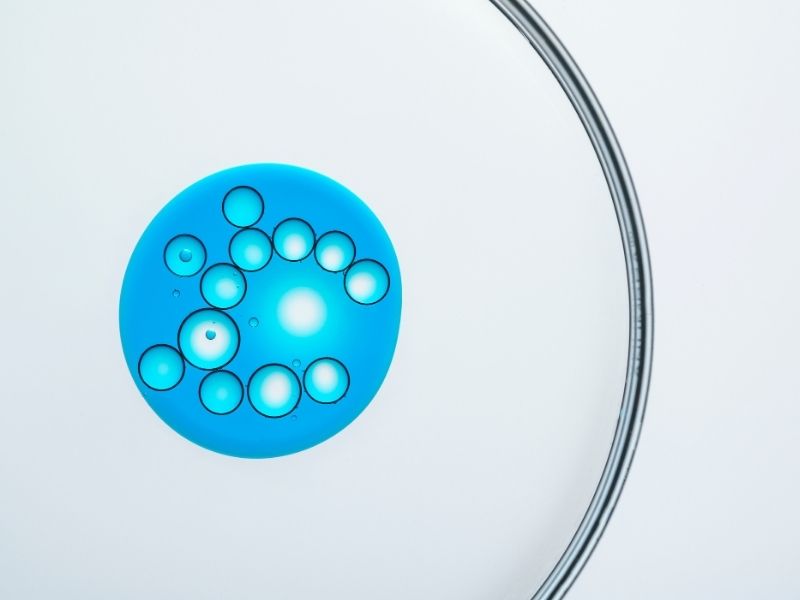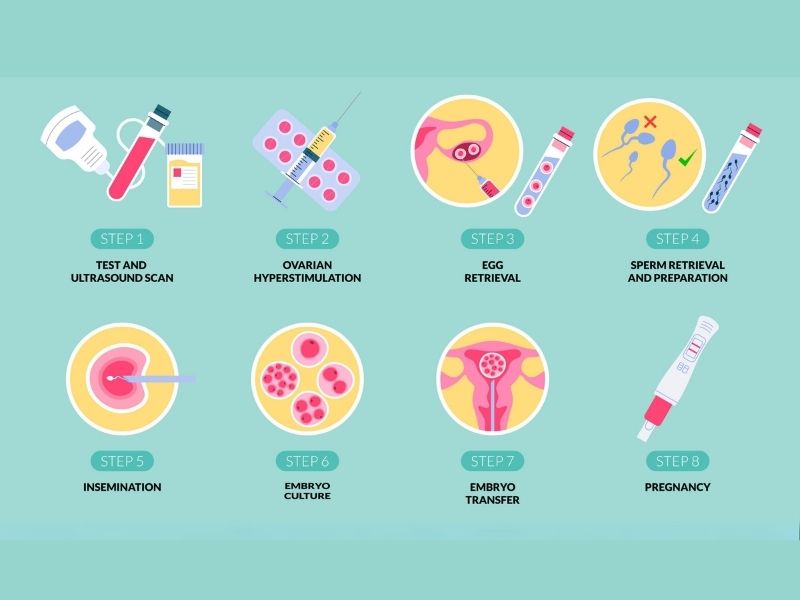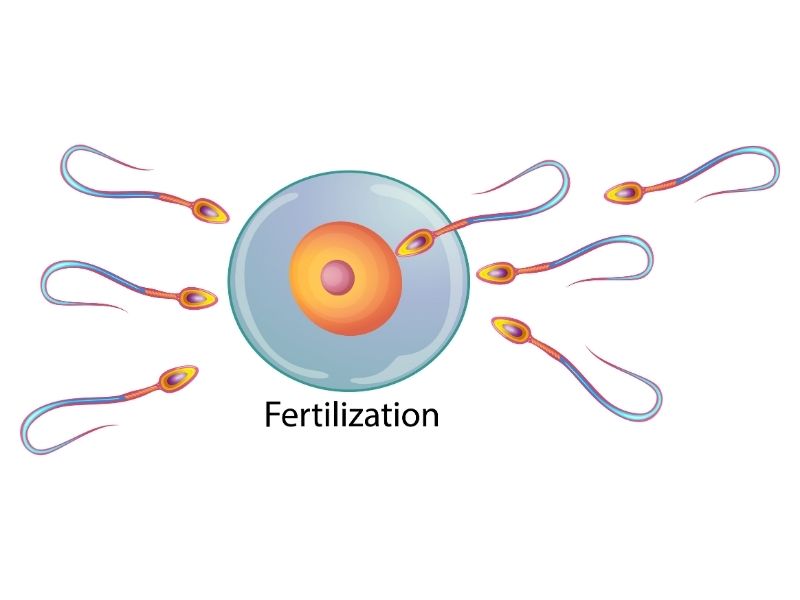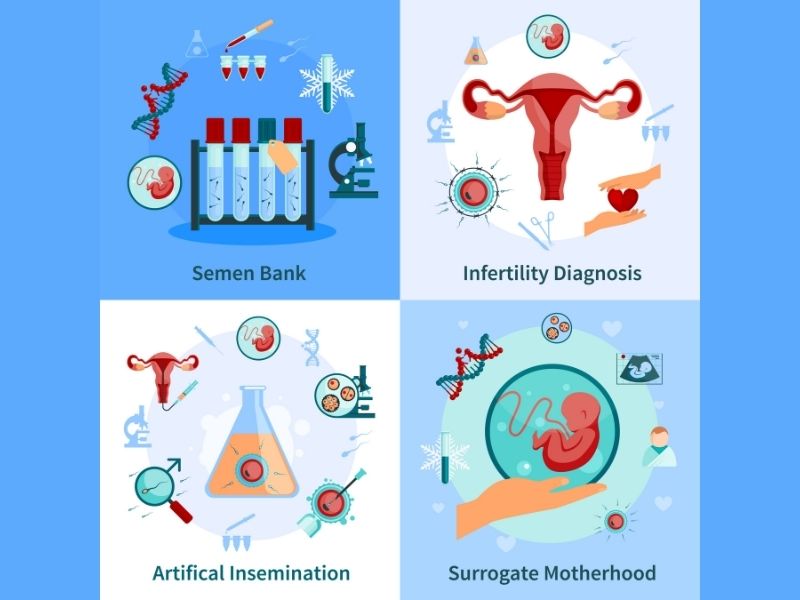IVF Exosome Treatment: An Innovative Approach
In recent years, the search for new and effective methods to achieve a higher chance of success in IVF treatment has been increasing. One of the most promising treatments revealed by this search is exosome treatment. So, what is IVF exosome and how is exosome used in IVF treatment? One of the newest developments in IVF technology is the role of exosomes.

What is an Exosome?
What is Exosome?
Exosome; They are the younger siblings of stem cells. Exosomes have a critical role in ensuring that cells perform their tasks in good health. Therefore, the number of medical studies on exosomes has been increasing recently.
Exosomes are extremely small extracellular vesicles and play an important role in intercellular communication. They contain bioactive molecules such as proteins, nucleic acids (DNA and RNA) and lipids that can influence cellular processes. Therefore, exosomes are considered as a potential tool to support embryo development and increase the chances of implantation by using them in IVF treatment.
After exosomes are secreted from the cell membrane, they diffuse into other cells or body fluids (blood, lymph, urine, etc.) around them.
Important functions of the exosome include intercellular signalling, regulation of the immune system and differentiation and growth of cells.
To whom is exosome treatment performed?
Exosome therapy can be used in many situations that may be beneficial in IVF treatment. In particular, it can be effective in areas such as increasing endometrial receptivity, improving ovarian function and supporting embryo implantation.
In addition, skin treatment with exosomes is also used in the treatment of various skin problems and diseases.
You should talk to your doctor about the use of exosome treatment in which area and for what purpose. Your doctor who performsIVF exosome treatment will help you in this regard.

Who is Exosome Treatment Performed?
What is IVF Exosome Treatment?
Exosomes are microscopic structures and are found in both male and female reproductive systems. Found in various body fluids such as semen, uterine lining and follicular fluid, these vesicles are secreted by cells and play an important role in communication. Research shows that exosomes are effective in reproductive processes such as embryo implantation.
Exosome therapy usually uses exosomes derived from stem cells. The aim of this treatment method is to influence the cellular behaviour of exosomes to regenerate and repair tissues. Especially in the female reproductive system, exosomes are thought to have therapeutic effects in conditions such as ovarian development, polycystic ovary syndrome, uterine diseases, endometrial receptivity and fallopian tube dysfunctions. Therefore, exosomes are seen as a promising field in infertility treatment.
What are the advantages of exosomes in IVF?
Potential advantages ofexosome-based therapiesinclude a more natural approach and the ability to support embryo development. In addition, the ability of exosomes to regulate intercellular communication may reduce the risk of failure in the IVF process and increase pregnancy rates.
What is the Role of Exosome in IVF?
In IVF treatment, exosomes may play an important role in the interaction of egg and sperm cells and embryo development. Research shows that exosomes can affect the fertilisation process and embryo implantation through the proteins, RNA and other substances they contain. Therefore, the use of exosomes in IVF treatmentmay have the potential to increase successful pregnancy rates.

The Role of Exosome in IVF
What is the difference between exosome and stem cell therapy?
Stem cell therapy is a treatment method generally used to repair or regenerate diseased or damaged tissues. In this treatment, stem cells obtained from the patient's own body or from external sources are used. Stem cells are undifferentiated cells and have the ability to differentiate into various tissues. Therefore, stem cell therapy is used to promote healing and regeneration of tissues.
Exosome therapy is a treatment method using exosomes obtained from stem cells. Exosomes are small vesicles located outside the cells and play a role in intercellular communication. In exosome therapy, exosomes obtained from stem cells are used to influence cellular behaviour and to repair or regenerate tissues. This method aims to utilise the therapeutic effects of exosomes instead of the stem cells themselves.
Therefore, while stem cell therapy involves the direct use of stem cells, exosome therapy involves the use of exosomes derived from stem cells.
How Does Exosome Affect IVF?
Communication between cells is important in natural conception. Exosomesare among the important structures that assume this role during or afterthe fertilisation process. Let's answer the question ‘How do exosomes increase the pregnancy rate?’ ‘What is the benefit of exosome in IVF?
- The effect of exosome on ovarian function: In IVF treatment, it is aimed to grow and collect a large number of eggs in one menstrual cycle. The better the number and quality of eggs, the higher the IVF success rate. Exosome treatment is thought to have a positive effect on egg number and quality, especially in women with low egg number.
- Fertility bed receptivity (Endometrium receptivity): We can also say ‘the readiness ofthe embryoto settle inthe inner tissue of the uterus’ or ‘the ability of the inner layer of the uterus to create a suitable environment where the fertilised egg can attach’. It is very important to catch the most suitable period for the embryo to attach in the uterus. We call this period ‘implantation window’. Exosomes can support the successful implantation of the embryo by changing or reprogramming the functions of endometrial cells in IVF treatment. Exosomes may regulate immune system responses and increase endometrial tissue acceptance of the embryo. Exosomes may increase communication between endometrial cells and help the endometrium create a favourable environment for the embryo to implant.

Exosome Effect in IVF
How is Exosome Made in IVF?
Exosomes used in IVF treatment are usually obtained from human cells. And which patients should be recommended to increase the chance of pregnancy should be decided by the physician who has experience in this field. It is a minimally surgical procedure. Each clinic applies exosome treatment differently. Let's talk aboutthe preparation process of exosomes:
Cell Culture Preparation : Firstly, appropriate cells are cultured in a laboratory environment. These cells are usually human trophoblast cells or other suitable cell types.
Growing the Cells: Cultured cells are grown in special media and under appropriate temperature and humidity conditions.
Collection of Exosomes: As the cells grow, exosomes are secreted out of the cell. These exosomes are then collected from the culture medium.
Isolation of Exosomes: The collected exosomes are isolated using laboratory techniques. This usually involves processes such as filtration, ultrasonication or centrifugation.
Cleaning of Exosomes: The isolated exosomes are cleaned by removing other cell debris. This step helps to increase the purity of the exosomes.
Characterisation of Exosomes: Finally, the size, morphology and content of the obtained exosomes are determined by various analysis techniques. These analyses are usually performed using methods such as electron microscopy, nanoparticle tracking analysis (NTA), Western blot and PCR.
This process preserves the natural properties of exosomes, enabling the production of quality exosomes for use in IVF treatment. Exosomes can be used as a potential tool to support embryo development and increase pregnancy success in IVF treatment
Exosomes can be given by injection or intravenously.
The effect of exosomes in IVF is monitored by ultrasound and blood tests after exosome treatment.

Exosome in IVF
Recent Advances in Exosome Research
Recent research has helped us to better understand the potential of exosomes in IVF treatment. In particular, certain molecules in exosomes have been found to be effective in improving embryo quality and implantation success. These findings support the use of exosome-based approaches in future IVF treatments.
Research on the role of exosomes in IVF treatment may open a new path in the field of fertility. These small but powerful vesicles have been shown to be effective at various stages from fertilisation to embryo development and pregnancy success. In the future, the use of exosome-based therapies in IVF is expected to become more widespread, which may offer couples a higher chance of pregnancy success.







